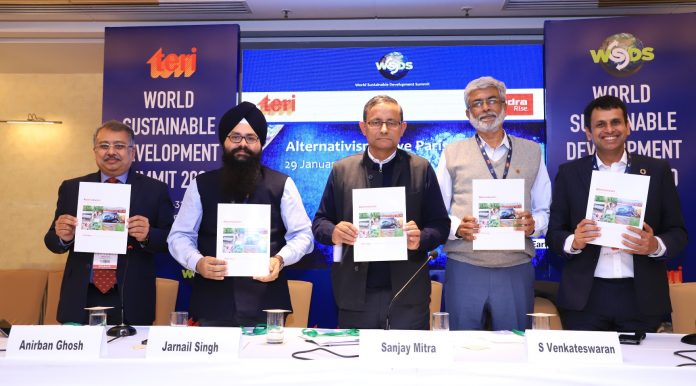Sustainability champions espouse ‘Alternativism’ at panel discussion on climate solutions to reduce environmental impact
· At a panel discussion on ‘Alternativism: Give Paris a Chance’, Sustainability leaders and millennials debate an urgent call for action to meet Paris Agreement objectives by 2030
· The ‘Alternativism’ report, compiling the findings of a survey by the Mahindra Group reveals high awareness levels still not driving lifestyle changes among Indians
· As per the ‘Alternativism’ study, today’s generation of Indians are more environmentally conscious than they have been at any time in history.
@ Vikas Sharma | Sr Journalist
New Delhi: A topical and engaging panel discussion on climate change at the World Sustainable Development Summit organized by TERI in New Delhi saw a mix of Corporate Sustainability heads, NGOs, policy makers and citizen stakeholders engaging on the need for urgent climate solutions and existing roadblocks to be overcome in order to translate thought into action.
Setting the context to the discussion titled ‘Alternativism: Give Paris a Chance’, Anirban Ghosh, Chief Sustainability Officer. Mahindra Group said “The Paris Agreement aims to strengthen global response to the threat of climate change and limit global temperature rise by the end this century to 1.5 degrees Celsius above pre-industrial levels. To reach this ambitious goal, there needs to be mass adoption of alternative ways of life in addition to greener ways of production and consumption. Both corporations and individuals must work together to make this happen”.
The discussion was held considering the recent survey undertaken by the Mahindra Group which reveals that 80 percent of Indians being aware of the Climate Change issue and 83 percent being ‘interested’ in making lifestyle changes to address it. The survey also found that 88 percent agree that their behavior may not always reflect this concern and that it is the absence of affordable, eco-friendly alternatives, that prevents them from being more environmentally considerate in their daily lives. 89 percent believe they would be able to address climate change more actively if companies offered alternative products and solutions.
Among other key revelations of the ‘Alternativism’, gender data indicates that Indian men are a tad more environmentally conscious and concerned with 72 percent men and 67 percent women saying they were aware about the need for water conservation. Also, 69 percent men and 66 percent women are more concerned about being impacted by water shortage.
Looking at demographic segmentation, 25-34-year-old Indians – 80 percent and those falling within the 45-55 age group – 81 percent seem to be most concerned on the environmental impact of single use plastic. When it comes factors driving product purchase decisions, 73 percent of 45-54-year olds and 70 percent of 25-34 year old men and women consider the utilization of energy resources and environmental impact in its manufacture.
These findings of Mahindra’s climate change study led to the coining of the term, ‘Alternativism’. This lack of alternatives is, in part, exacerbated by conventional thinking being applied to solutions that address climate change. Sustainability experts agree will only be achieved through unconventional, alternative thinking with respect to business models, production, materials, infrastructure, commercial propositions, valuations, etc.
Another panelist, Shankar Venkateshwaran, founding team, ECube Investment Advisors, said, “You need to be aware that when you take action, know in detail about the pluses and minuses of the solution before adapting. Ultimately it is about making frugality cool and corporates have a role to play in making these green products available.”
The Mahindra Group is keen to promote greener options because of the challenge posed by climate change. The Group has, for the past decade, worked towards offering greener products across its businesses including mobility and energy solutions, green buildings, micro-irrigation and other technology solutions.

















